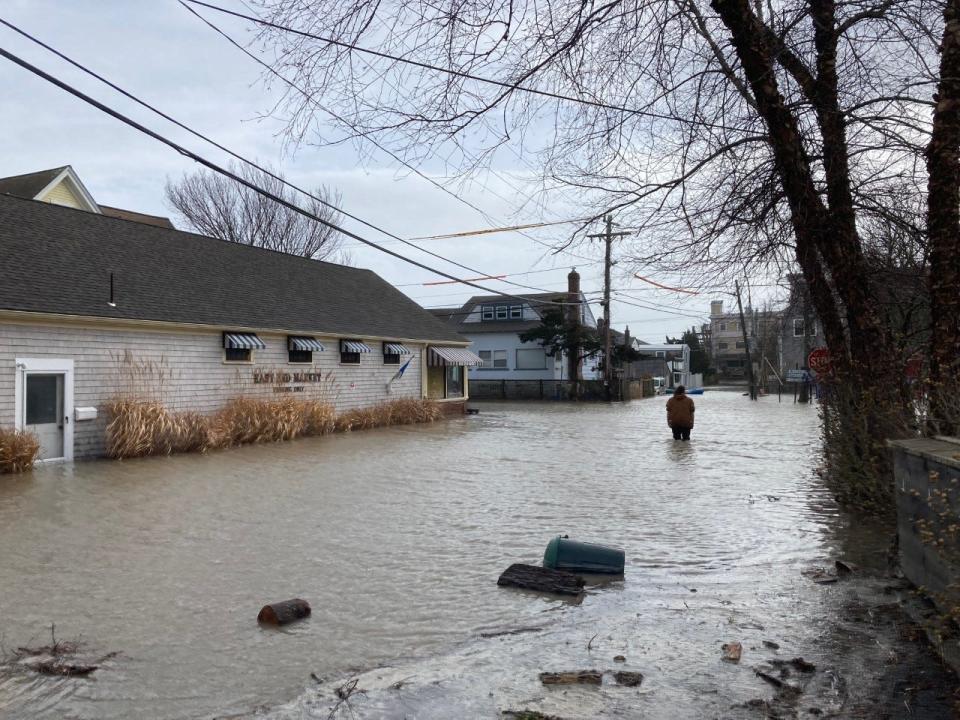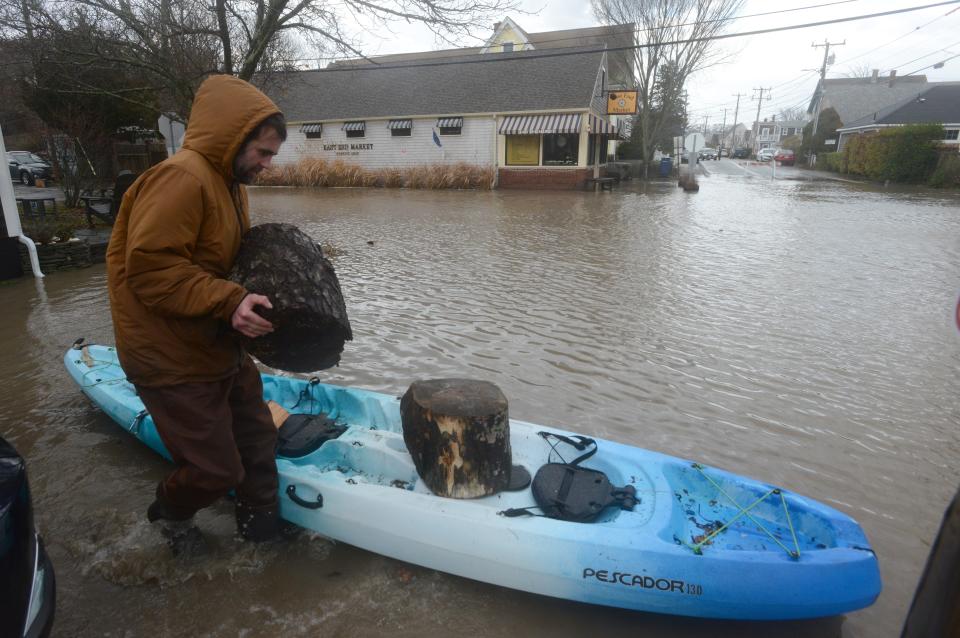'Actual risk.' Why flood insurance rates on Cape Cod may rise for some, fall for others
PROVINCETOWN — Quinn Taylor has been trying to get his Commercial Street condo’s extensive damage fixed since the Dec. 23 storm flooded his home.
The storm drove winds and water northward into the East End portion of the harbor. Water came through low-lying alleys and beneath a few homes that had been raised. It left hundreds of thousands of dollars of damage in its wake.
It was a hard storm on the wallets of property owners with flood insurance. Taylor had flood insurance but is still waiting for the insurance company to pay for all the damages. He called working with the company "frustrating," and their response to his calls and questions "lackluster." He claims he's gotten just over half of what he was told he was getting. To add insult to injury, the company did not renew his policy.
"The frustration is, it’s like you’re talking into the void. They don’t respond," Taylor said. "Of course they dropped us."

The rates for many insurance policies — for both flood and homeowners insurance — have increased drastically. Some insurance companies are sending notices of non-renewals. And some are not offering policies at all to those with properties near coastal and flood areas.
The Cape is not the only place insurance is getting harder and more expensive to purchase.
According to the Insurance Information Institute, damage from natural disasters, including floods, severe storms, and wildfires, reached $92 billion in 2021. Losses from natural catastrophes reached $400 billion between 2017 and 2021. In the wake of severe weather events and wildfires, three major insurance companies have left Florida, four announced they were not going to sell new policies in California, and 20 companies have left Louisiana.
A new Federal Emergency Management Agency (FEMA) risk rating, known as 2.0, implemented fully in April, has increased rates for some on Cape Cod and lowered rates for others. There's a new focus on elevation and risks associated with individual properties in the new risk rating. Also, the National Flood Insurance Program, instituted in 1968, is set to expire Sept. 30. The program has had 21 short term extensions since 2017. Barnstable County Floodplain Specialist and Community Rating System Coordinator Shannon Hulst said the program has been surviving off short term extensions.
"In 2012 and 2014 there were major overhauls by Congress," Hulst said. "There have been several bills in place to make the program better, but it's not an easy fix."
Rate increases based on FEMA's Risk Rating 2.0, flood maps
The Federal Emergency Management Agency's flood maps and their Risk Rating 2.0 figure prominently in rate changes, according to Hulst. Risk 2.0 assesses a variety of flood risk variables including flood frequency, whether floods are due to river overflow, storm surge, coastal erosion, and/or heavy rainfall, the distance from a water source, and property elevation. The cost to rebuild is also taken into consideration.
Prior to 2.0, everyone in the same flood zone was considered to have the same risk. Now each property is considered on its own. A pier foundation that raises a home off the ground can lower risks, so can property elevation and distance from the source of potential flooding. A structure 500 feet from the ocean will likely pay a higher rate than one 2,000 feet away, even if they are in the same flood zone.
"A lot (of policies) have been subsidized for a long time," Hulst said. "They want people to pay based on their actual risk. Rates will go up every year until they reach an actuarial full risk rate."
An actuarial rate is an estimate of the expected value of the future losses of an insurance company. Too many losses in one area can cost a carrier an exorbitant amount of money. It happened to insurance companies in Florida when Hurricane Ian decimated properties there. It happened to companies in California impacted by wildfires. That risk has to be spread around or carriers will lose more money than they take in.
Risk Rating 2.0 was initially released in April 2021, but has been instituted over a period of time. Now everyone is rated under 2.0, according to Hulst. About 40% of policy owners in Massachusetts have seen their policy costs drop and 50% have experienced increases of about $120/year for properties worth $400,000 or less, she said. The increases are higher for properties worth more than $1 million. Some policy holders will see no change in their rates.
Who offers flood insurance on Cape Cod?
Some private insurers in the commonwealth offer flood insurance policies, but there is coverage available through FEMA's federally funded National Flood Insurance Program. The program was established in 1968 to provide access to flood insurance and cut flood risk with floodplain management practices.
The program offers coverage for a home’s structure and belongings, including the foundation, electrical systems, plumbing, appliances, and personal belongings. Coverage is limited to $250,000 for the building and $100,000 for the building contents.
For business owners, the national program offers up to $500,000 in coverage for "direct physical damage to buildings from or by flooding," including damage to floors, walls, ceilings, plumbing, electrical and HVAC systems.
About 35% of the structures in floodplains have flood insurance coverage on Cape Cod. Since 2015, the number of flood insurance policies has dropped 9% on the Cape.
Maureen Green, who is in residential real estate sales with Kinlin Grover Compass in Harwich Port, said most of her customers know about the flood zones on Cape Cod. She said about half of the buyers she deals with are not interested in looking at anything in a flood zone.
"Anecdotally, properties in a flood zone are a little depressed because half the market is not interested because it's in a flood zone," she said.

Oriana Conklin bought the East End Market in Provincetown in 2022, before the Dec. 23 storm that pushed water up through the floorboards. She thought her insurance policy included coverage for floods, but after poring through the document, she found flood damage was excluded. The business insurance policy she had covered some damages to the structure. The coverage did not include loss of income during the two months she was closed while replacing floors and drywall and sanitizing the place.
"Flood water is not something you want in your house or business," Conklin said.
Homeowners versus flood insurance
Only properties with federally-backed mortgages are required to carry flood insurance. A homeowners policy does not cover flood damage. Even homeowners policies have seen a significant "tightening" across the country, according to Lynn Mason-Small, managing director for Middle Market Business Strategy with RogersGray Insurance. The company has 12 offices in Massachusetts and has several thousand flood policies, she said.
The National Flood Insurance Program is set to expire Sept. 30. The program has experienced 21 short-term extensions since its last multi-year reauthorization, according to FEMA. The agency proposed reforming the program in May of 2022. A bill to reauthorize the program is currently before Congress.
The reauthorization act, sponsored in part by U.S. Sen. Bob Menendez, D-New Jersey, would cap annual rate increases at 9%, provide vouchers for low- and middle-income policy holders, invest in mitigation efforts, limit private insurance company profits and give authority to FEMA to terminate contracts with insurers who abuse the system.
Community Risk Rating: investing in mitigation efforts
The Community Rating System awards discounts on flood insurance to communities that have undertaken actions to reduce flood risks and limit damage loss. Those actions can include anything from preserving open space in a flood plain and improving coastal resiliency to enforcing building codes. Not having structures built in a flood plain helps.
Nine Cape Cod towns participate in the voluntary program, according to FEMA. As of April 1, flood insurance premium rates in Brewster, Eastham and Provincetown are discounted 10%. Premium rates in Chatham, Harwich, Mashpee, Orleans, Sandwich and Wellfleet are discounted 15%.
Provincetown Community Development Director Tim Famulare said the town has done a number of things to get that 10% discount for residents buying flood insurance through the National Flood Insurance Program.
The town has a hazard mitigation plan that's been updated every five years and the town has worked hard to get conservation restrictions and easements on private properties that lie in flood plain areas, Famulare said. He credited Building Commissioner Anne Howard for coordinating the program and enforcing flood plain regulations in the building code.
Paving Commercial Street with porous pavement is just one way the town has improved storm water management, though it has what might be considered an unusual requirement.
"It needs vacuuming to pull up the dirt and dust that accumulates in the asphalt," he said.
Famulare credited Building Commissioner Anne Howard for coordinating the town's flood insurance program requirements and enforcing flood plain regulations in the building code.
Denise Coffey writes about business and tourism. Contact her at dcoffey@capecodonline.com.
Thanks to our subscribers, who help make this coverage possible. If you are not a subscriber, please consider supporting quality local journalism with a Cape Cod Times subscription. Here are our subscription plans.
This article originally appeared on Cape Cod Times: National Flood Insurance Program authorization could expire in 2023

